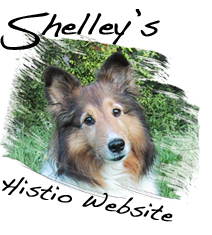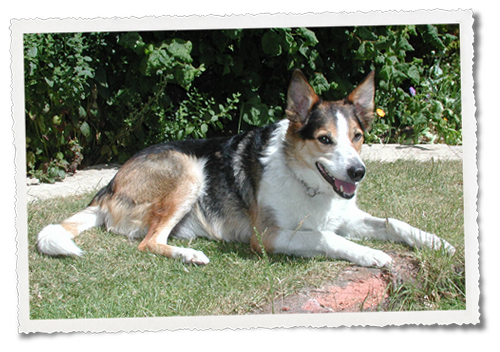
HOME
 YOUR HISTIO STORY
YOUR HISTIO STORY
I am looking for similarities
in all individual cases of
Histiocytic diseases.
I wonder if we all tell our
stories we might come up
with some commonality
between the specific
situations in which all of
our pets got this disease.
So please email me the
details and I'll put your
pets story on Shelley's
Histio Website
 UW HISTIO VERHAAL
UW HISTIO VERHAAL
Ik ben op zoek naar
overeenkomsten in alle
individuele gevallen van
Histiocytose.
Ik hoop dat wanneer wij
onze Histio verhalen
vertellen, wij overeen-
komsten ontdekken over
de manier waarop onze
huisdieren deze ziekte
hebben opgelopen.
Stuur mij de details en
ik zal het verhaal van uw
huisdier op de Histio
website van Shelley zetten.
 WARNING !
WARNING !
These stories are all
different. Individual
symptoms, situations
and circumstances
may vary and response to
therapy is not always the
same.
- Disclaimer -
 WAARSCHUWING !
WAARSCHUWING !
Deze verhalen zijn allemaal
verschillend. Individuele
symptomen, situaties en
omstandigheden kunnen
verschillen en de reactie
op therapie is niet altijd
hetzelfde.
- Disclaimer -
HISTIOCYTOSIS IN
OTHER LANGUAGES
German - Hund
Maligner Histiozytose
French - Chien
l'Histiocytose Maligne
Italian - Canis
Maligni Histiocytosis
Spanish - Perros
Histiocitosis Maligna
Dutch - Hond
Maligne Histiocytose
HOME
Jack
Malignant Histiocytosis
Border Collie
Male
February 3, 2002 - September 6, 2010


Story told by Sandra C.
When we visited a local farm, 8 years ago, Jack chose us. Our border collie (with a possibility of German Shepherd(?)) bundle was to become a very special member of our family so it is with a very heavy heart that I add our story to this website, in the hope that our experience will help you.
In February 2010, we were on holiday in Scotland when we first noticed Jack limping in his front leg. But it wasn’t unusual as he was a very active dog and he’d been running around a lot, guarding us from the local sheep, the odd car and the cows that surrounded our house!
Over the next few weeks, the limp was intermittent; sometimes noticeable and sometimes not, so we put it down to a touch of arthritis.
After 6 weeks, on April 16th I took him to our vet, believing that she might be able to give us some medication to help him when the limp seemed worse. It was such a shock when she examined him and felt a large lump, right at the top of his leg, underneath his shoulder bone. She hoped it was a muscle problem, but her first instinct was that he had developed a bone cancer, apparently common in middle-aged dogs although unbeknown to us.
After a long weekend of waiting, Jack returned to our vet for an x-ray and our vet was delighted to report that the bone was fine – no sign of any problems, so it must be muscle-related. She next proposed a complete 4-week rest period, to give it time to heal, and although it was difficult, we kept Jack in, tried to make him rest and took great care.
When we returned we were initially optimistic. In our eyes, Jack had stopped limping, the lump felt flatter and he seemed fine in himself. The news that it was actually his medication which was preventing the pain and therefore his limp, coupled with the fact that the tumour had also grown – making it appear to be less prominent – was devastating.
We were referred to a specialist centre and I drove there in the rush hour on a wet and miserable morning. I stayed all through the day whilst Jack was examined by a specialist vet, had CT scans taken and a biopsy, under anaesthetic. For the second time Jack emerged feeling groggy from the process and I promised him I would not put him through anything else if I could avoid it. His big brown eyes looked so sad.
The vet’s verdict was that he definitely had a soft-tissue tumour but as it was in his shoulder muscle and didn’t appear to have spread to his lungs, he had a good chance of survival if the leg was amputated. This was very hard to take and we wondered how our agile and energetic dog would feel if we did this to his body. Would he adapt? Was it fair? In the end, after a lot of soul searching we thought he would prefer to stay with us, even if his mobility was affected, so we prepared ourselves mentally. Three days later, the vet rang back – the biopsy results had been analysed and Jack had a particularly aggressive form of cancer and if it was his dog, he wouldn’t put him through the amputation. There wasn’t much we could do. It didn’t seem fair to Jack to take away his leg, just so he might have a few more weeks or months of life with us so we decided to let nature run its course.
By now we were in the middle of June and it was so difficult to take when Jack seemed as interested in life and going everywhere with us as he always had. Knowing we were going to lose him seemed unreal, yet also very imminent as we didn’t know how long he might have. The vet had said about 5 and ½ months from the first symptoms.
As we researched the condition, we came across your web site and although the stories were harrowing, it helped to know how others had coped.
Jack was able to join us for two more spells in Scotland, where he could enjoy more freedom and open space than at home. He assumed his position near the fence and watched everything as if nothing was wrong. Over the weeks, we videoed him as much as we could, took endless photos and spoilt him more than we ever had before. Over the weeks we could see the tumour spreading on his leg and eventually disfigure his shoulder quite badly. But Jack still wanted his walks, although we didn’t go as far and relied on him to tell us when he’d had enough. His appetite was unchanged and he still loved life.
By the middle of August Jack was slowing down a little but we do have film of him fetching toys and running around the garden even then. We had unwittingly been giving him a double dose of his painkiller and we’ll never know if that helped him, although the vet said it could have unpleasant side-effects and we should stop straight away. A couple of times, he went into moods where he didn’t move for several hours, making us wonder if the time had come. But the next day he was different again so we went on for about two weeks, worrying about uncharacteristic actions in this way.
Looking back, Jack started to deterioirate about a week before he died when he started losing weight from his back legs and he found it harder to lower himself-just flopping sometimes as if it was too much effort. He also started to go to the toilet infrequently and his tummy seemed to swell up sometimes, although not all the time. He also, twice, had a sort of mini-'absence' as if he didn’t know what was happening but it didn’t happen again so we were thankful for that.
We now know there was also a large tumour on his spleen which was the reason behind these symptoms, but he was still eating chicken up to his very last morning, when he went into a long sleepy spell with no interest in his surroundings any more. On 6th September we asked the vet to call and our precious friend slipped away at home with us next to him.
Looking back, the things I wished I’d known were:
– Jack remained relatively well until his last week, essentially, so I wasted a lot of time worrying we would lose him imminently instead of just enjoying him;
– The medication he received (painkillers) appeared to work very well as Jack didn’t seem to be in pain or limit his activities much;
– I was worried about being with him when the end came, if he was to be ‘put to sleep’, but it was so right to be with him I’m glad I didn’t leave him.
It’s twelve weeks since we said ‘good-bye’ and the pain lessens a little most days; though the hole in our lives is still enormous. But others do suffer worse things and at least we can look back and know we enjoyed so much love whilst Jack was with us. No-one can ever take that away.....

